Romantic or Real
Romanticism cannot be identified with a single style, technique, or attitude, but romantic painting is generally characterized by a highly imaginative and subjective approach, emotional intensity, and a dreamlike or visionary quality. Romantic art characteristically strives to express by suggestion, states of feeling too intense, mystical, or elusive to be clearly defined. Realism, on the other hand, is an attempt to describe human behavior and surroundings or to represent figures and objects exactly as they act or appear in life. Attempts at realism have been made periodically throughout history in all the arts; the term is, however, generally restricted to a movement that began in the mid-19th century, in reaction to the highly subjective approach of romanticism. The works of John Constable and Honoré Daumier show the great differences in Romantic characteristics and Realist characteristics, both with the subjects they painted and the styles that they used to paint.
John Constable was an English painter who was known for his landscape painting in the romantic style (Encarta). Constable was a leader in presenting an idealized image of rural life and nature. He infused quiet English landscapes with profound feeling. Constable's "The Hay Wain" is a countryside scene. It helped to add features to the romantic motifs, such as streams, country cottages, and farmland scenes (Matthews and Platt 465). One could almost hear the wind blowing through the trees and sound of running water. The visionary or dreamlike quality is portrayed in this painting with the use of natural coloring and lighting. He was known to focus on the intangible qualities, like the conditions of light, sky and atmosphere, than with the concrete details of a scene. He achieved a freshness of vision through the use of luminous colors and bold, thick brushwork. With the play of individual imagination, Constable gave expression to emotion and mood.
Honoré Daumier was a French painter who focused on the realistic themes of everyday life (Encarta). Unlike the themes of Constable and Romanticism, Daumier wanted to be realistic and paint everyday events involving ordinary people. In his painting "The Third Class Carriage," Daumier displays the everyday middle class peasants on a train. He does not give each person individual characteristics but instead uses stereotypes (Matthews & Platt 498). He uses dark, muted colors instead of luminous colors like Constable. His free brushwork gives the painting an almost unfinished quality. He also chooses to focus on the separateness of each traveler even though they are all so close together in this small train car. There is no imagination at work here; this is strictly a painting of everyday life as Daumier sees it.
Romanticism and Realism are like night and day. One shows the imagination at work and the other focuses on the harsh reality of the everyday world. Constable and Daumier use two different styles of painting. Constable uses luminous colors and bold brushwork to bring his painting the "The Hay Wain" together as a whole, while Daumier with his dark tones and free brushwork chooses to separate his subjects in "The Third Class Carriage."
Word count 510
Works Cited
"Constable, John " and "Daumier, Honoré." Microsoft Encarta Online Encyclopedia 2001. 1997-2001 Microsoft Corporation. .
Matthews, Roy T., and F. DeWitt Platt. The Western Humanities. 4th ed. Mountain View, CA: Mayfield, 2001.
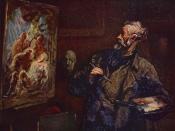
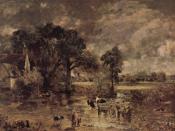
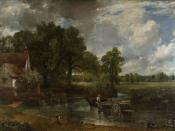
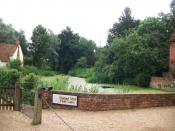
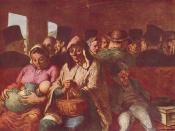
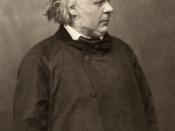
Praise
This is a wonderful essay, definately college level and worthy of an A. You should be proud of this piece of work. You know and explained your subject well.
6 out of 6 people found this comment useful.